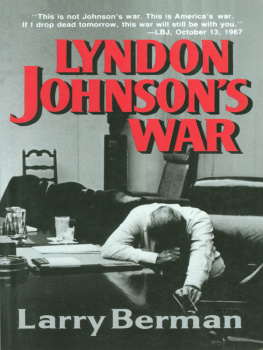Table of Contents
Guide
About the Author
A prolific author with eight previous books to his credit, Harlan Ullman is an internationally recognized innovator and strategic thinker credited with creating the concept of shock and awe as well as a brains-based approach to strategic thinking and the thought-provoking idea of an era of No World Order. In addition to chairing two private companies, he is Senior Advisor at both the Atlantic Council and Business Executives for National Security (BENS) and is UPIs Arnaud deBorchgrave Distinguished Columnist. While serving in the U.S. Navy, his past experience includes 150 Swift Boat combat operations in Vietnam, two years in the Royal Navy, command at sea, and a number of senior Pentagon assignments ashore.
Caro, Robert A. Master of the Senate: The Years of Lyndon Johnson. New York: Alfred A. Knopf, 2002.
Chollet, Derek. The Long Game: How Obama Defied Washington and Redefined Americas Role in the World. New York: PublicAffairs, 2016.
Halberstam, David. The Best and the Brightest. New York: Random House, 1972.
International Institute for Strategic Studies. The Military Balance. Published annually.
Powell, Colin, with Joseph E. Persico. My American Journey: An Autobiography. New York: Random House, 1995.
Ullman, Harlan K. A Handful of Bullets: How the Murder of Archduke Franz Ferdinand Still Menaces the Peace. Annapolis, Md.: Naval Institute Press, 2014.
Woodward, Bob. State of Denial: Bush at War. Part III. New York: Simon & Schuster, 2006.
Las Vegas at the Skybridge Strategic Alternatives Annual Conference (SALT), May 2015. Harlan K. Ullman (HKU) is presenting his book A Handful of Bullets: How the Murder of Archduke Franz Ferdinand Still Menaces the Peace.
Conferee: You just made the case that the biggest threat to society is failed and failing government. Can you also explain why it is that the United States has lost every war it has started since 1945? Is it because government fails, or something else?
HKU: Your question is my next book. The simple answer is that no matter who or what party is in power and whether the president is seasoned or inexperienced, ideology, political expediency, and failure to pose and answer difficult questions or to challenge basic policy assumptions too often dominate and become surrogates for sound strategic thinking. Nor do we always fully understand the issues and consequences of action and inaction. Vietnam was the most blatant example. The second Iraq war is another. And the intervention in Libya in 2011 is a third.
Every time we initiated using force without just cause or legitimate provocation, the results at best damaged our security and at worst were far more destructive. Unfortunately, every administration since Vietnam, less onethat of George H. W. Bushignored or did not understand this reality.
Without a major revolution in how the nation provides for the common defense and its security, do not expect the future will prove any more successful than the past five decades when we decide to commit force to protect or advance our interests. The most worrying possibility is that this propensity to start wars and use force for the wrong reasons may now be deeply embedded in the nations DNA.
That does mean we should not use force when we must. But we must be certain when we do use force that it is for the right reasons and in our national interest.
Over the last century, why has the United States, despite overwhelming industrial and military superiority, lost the wars it started without just cause? Evidence of failure is unmistakable from the Vietnam War and its 58,000 American dead to the more recent debacles in Iraq, Afghanistan, and Libya. They are unlike World Wars I and II and a Cold War that if mishandled could have led to thermonuclear Armageddon. America then was responding to external threats that started or provoked these conflicts: the kaisers Germany in 1917, Hitler and Japans military junta two and a half decades later, and the Soviet Union in the aftermath of World War II.
At best, Korea was a draw, even though the North was the undeniable aggressor when it invaded the South in June 1950. The attacks of September 11, 2001, that destroyed New Yorks Twin Towers and part of the Pentagon in Washington, D.C., warranted a strong response. But the global war on terrora misnomerso far has failed by exacerbating, and not neutralizing, the dangers posed by violent Islamist extremism.

In identifying and dissecting reasons for these failures, we ask: Why over the past decades have successive administrations of both parties, despite asserting that force was a last resort, too often turned to force as the first resort of policy, ignoring or marginalizing other tools of government? A corollary question about this record of failure is, Why, since the end of the Cold War, have the United States and both of its political parties seemed incapable of applying sound strategic thinking and judgment, of treating the causes and not the symptoms of crises, threats, and challenges to security and well-beingand always with predictable and unwanted results?
Has this propensity for failure become permanently grafted onto Americas political DNA? Is failure a product of a political system that is seemingly unable or unwilling to govern, that has elected for the past two dozen years presidents who were insufficiently ready or prepared for the exceedingly difficult demands of the office they assumed? Or do todays multifaceted, complex, and numerous challenges, some of which defy solution, simply exceed the capacity of any individual and administration, no matter how capable, to respond effectively?
Failure or success in foreign policy is often, to quote the Duke of Wellington, a close-run thing. But even before the end of the Cold War, Vietnam should have made clear that when the United States intervenes and starts a war for mistaken reasons, especially the most flawed reasons, it will fail. Since the end of the Cold War, interventions in Iraq, Libya, and most likely Afghanistan have repeated these unfortunate outcomes. These failures have also provided ample ammunition for critics with which to assail the foreign policy and strategy of every administration.
Presidents dating back to George Washington and their administrations have been accused of having no strategy, the wrong strategy, or simply an ineffective strategy on which to base foreign policy. Vitriolic debate over foreign policy is neither new nor unique to today. Before the attack on Pearl Harbor on December 7, 1941, Americans by an overwhelming majority resisted and resented Franklin D. Roosevelts efforts to side with Britain after Hitler declared war on civilization and occupied virtually all of Western Europe in 1940. The Vietnam War too deeply divided America. Still, it took years for Washington to recognize that the war in Southeast Asia was lost and withdrawal inevitable.
Over the two and a half decades since the end of the Cold War, in terms of the most significant foreign-policy issues, failure has been too frequent. If the United States is to change this dangerous reversal of fortune, to fashion more effective strategies, what can or must be done? Or has the likelihood of failure, not success, become the new normal?
A crucial question must be asked and answered, especially by those seeking to hold high office. Why and how have American strategies involving the use of force succeeded in the past, and why have they failed? Given the challenges and threats of the twenty-first century, fuller understanding of the reasons for and factors in successand, perhaps more important, for failureis imperative. The process of enhancing the chances for success may be better informed by focusing first on failures.
Next page









